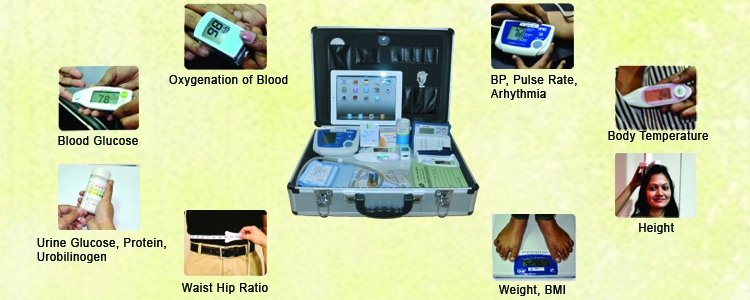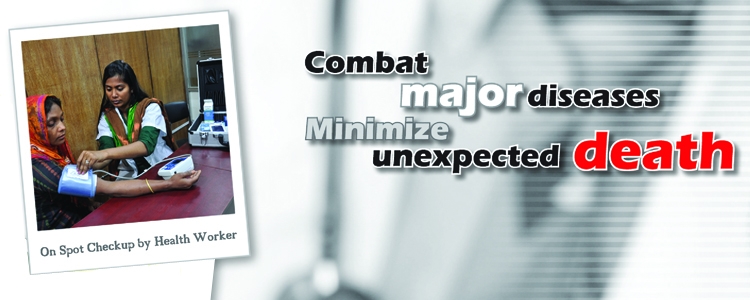Portable Health Clinic

Portable Health Clinic (PHC) is an ICT based telemedicine healthcare service delivery system aims to build an affordable, usable and sustainable preventive healthcare system for unreached people. In 2007, Dr. Ashir Ahmed (Associate professor, Department of Advanced Information Technology, Kyushu University, Japan and Director of Global Communication Center, Grameen Communications) and his team developed a health-booth (a size of a telephone/ATM booth) containing necessary diagnostic tools. The idea was to set one booth in one village so that the villagers can come to the booth, take measurements and send data to the remote doctors. But looking at the size of the booth, Nobel laureate Professor Muhammad Yunus insisted that “people should not go visit hospitals, rather hospitals should visit people”. He also asked to add a human (preferably a trained healthcare lady) being to take proper measurements and explain the prescription to the patients. Keeping the suggestion in mind and joint collaboration with the researchers of Kyushu University, Japan in 2009, the health booth transformed into a portable one so that the healthcare lady can carry it; which is now called Portable Health Clinic (PHC).

Initially PHC aimed to deliver telemedicine supported healthcare services to the rural unreached people only focusing on Non Communicable Diseases (NCDs’). But gradually it was realized that PHC is equally important for the urban ageing community. And thus till April-2020, PHC served more than 43,000 people. From the inception, PHC has been replicated in 11 districts of Bangladesh; i.e Dhaka, Chandpur, Cumilla, Chattogram, Bogura, Thakurgaon, Jashore, Kushtia, Tangail, Barishal and Shariatpur. Beside that PHC has been replicated in 5 developing countries as well, like India, Pakistan, Thailand, Cambodia and Liberia. And now a days, the demand of telemedicine based healthcare service delivery is increasing and some healthcare professionals are even thinking to introduce this service in developed countries also; especially focusing the increased ageing community, some researchers of Kyushu University is genuinely thinking to introduce PHC service in Japan. On that issue, our researcher team is jointly working with them.
On the other hand, our Garment industry is also realizing the growing importance of starting healthcare services to their workforce to comply with buyers demand. And as we all know, there are huge shortage of doctors till now in Bangladesh; so it is almost impossible to ensure physical presence of doctor in every garment factory 24/7. Thus PHC could be another realistic source for our garment industry. Hence PHC has been supporting in healthcare sector for Epyllion group and PRIMARK and as of now more than 12,500 garment workers have received healthcare services through PHC.
Initially PHC was started with primary healthcare services but gradually it has been observed people; both from urban and rural areas demands secondary healthcare service also. Noticing this increasing demand, some other modules have also been developed and incorporated in PHC system and started delivering service on PHC Tele-pathology, PHC Tele-eyecare and PHC Maternal & Child Healthcare (MCH) sector. PHC Tele-pathology services started in the year October-2016 in Thakurgaon, Bogura and Barishal districts and so far 3,391 people have received services. On the other hand, PHC tele-eyecare and PHC Maternal & Child Healthcare (MCH) services started in the year July-2017 and June-2019 respectively in Natore and Shariatpur districts and under these projects 4,370 and 124 people have already received healthcare services.
In addition to primary healthcare services, Grameen Communications and Kyushu University jointly conducted several longitudinal study on the cohort group of people comprising both urban corporate community (Grameen organizations) and rural community (Ekhlaspur, Chandpur) through PHC. 477 people received four times healthcare services after every 3 months through PHC model for 1 (one) year to observe any changes or development in their health data collected by using PHC system.
No matter how fast PHC expands, we need to keep pace with this ever growing speed. And our workforce is also transforming by gaining knowledge in the form of receiving trainings within country and abroad. In last three consecutive years (2017 – 2019), a number of 18 persons received advanced training on healthcare from Kyushu University and Hiroshima University from Japan. These trained workforce are working with PHC and providing trainings and disseminating their gained knowledges to others those who are working with PHC. As of now 55 Doctors, 70 Health Workers and 47 ICT Assistants from different NGOs’, entrepreneurs, garment factories, ICDDR-B, Kumudini Nursing College received training on PHC within Bangladesh. Beside these, 12 medical professionals from Biyani Group of Colleges, Jaipur, India; 5 medical professionals from Shalamar Institute of Health Sciences, Lahore, Pakistan and 6 medical professionals from Asian Institute of Technology (AIT), Thailand received training on PHC. Furthermore, Grameen Caledonian College of Nursing (GCCN) has incorporated PHC as a Non-Credit course in their course curriculum and till now 80 Diploma Nursing students and 50 B.Sc Nursing students are enrolled with PHC course.
To see the upgrowing demand of PHC in different healthcare sector has made us very optimistic and it indicates PHC could be used in versatile way and in different magnitude. We transformed PHC in different shapes thus PHC system could be compatible with societal healthcare needs. We started to serve children (age between 3-14 years) under PHC Child Module in Ekhlaspur, Chandpur and in the year January-2020, 50 school going children have received healthcare services. It is still under piloting phase but soon we have plan to go commercial replication with this module. Even in the pandemic situation of nCov19 (Covid-19) worldwide including Bangladesh, a new module is now in the process of development under PHC system. We hope to start working on this issue (Covid-19) very soon and initially we have plan to support 1,250 people with doctor consultation support.
During this journey, it is already demonstrated that PHC is a proven and effective healthcare service delivery model with sound technology. The compatibility and user friendly mood of PHC enable us to open windows for all. Healthcare service is not something which should be necessarily delivered ensuring physical presence of a doctor rather it is more important to have the consultation of a doctor by any means; even by using ICT tools. According to the World Health Organization (WHO), where 67% people are dying every year by NCD related diseases in our country; in this context, we think PHC is the proven healthcare service delivery tool can be used to solve social problems. By all these experiments, piloting & demonstrations, it has been confirmed PHC can be replicated in any part of the world.